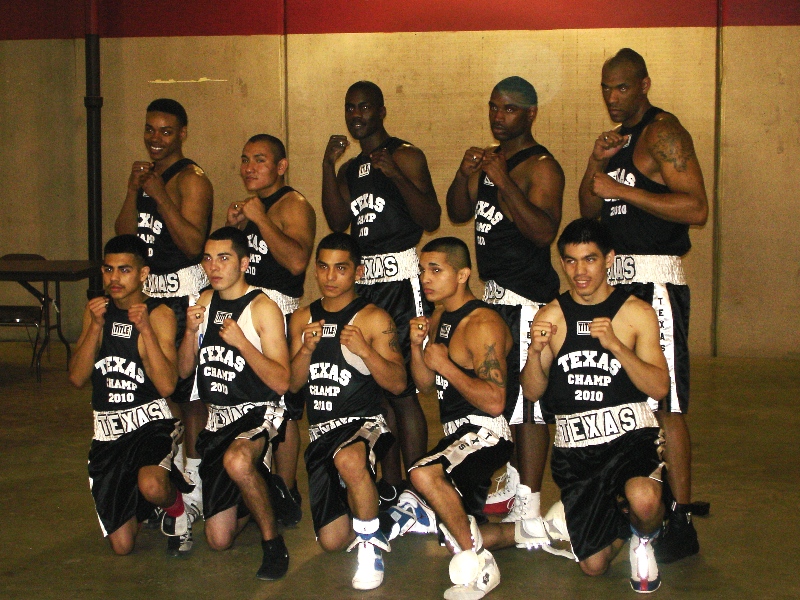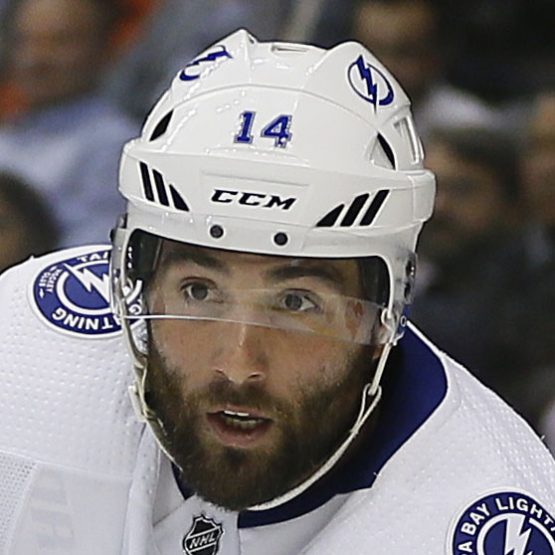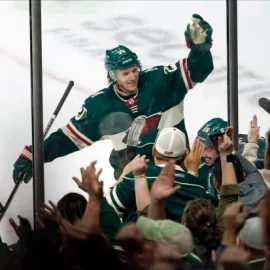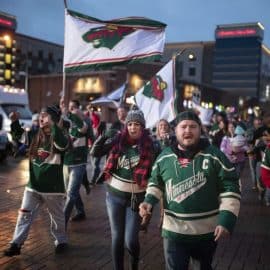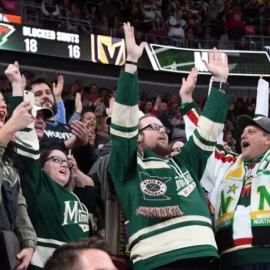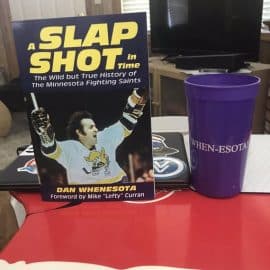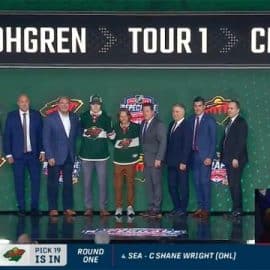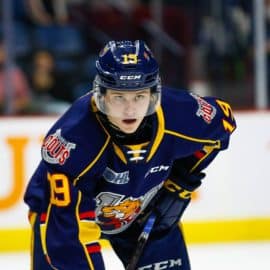
Hard work does pay off, its something we tell young people all of the time. Whether as coaches, as teachers or as parents as you try to instill work ethic so they can overcome the challenges and hardships one faces as they grow up. Or at least that’s what you hope. For some people the rewards for such hard work can seem elusive or take a very long time. During that arduous journey, a person might question themselves and whether they made the right choice. For hockey players one of those moments of questioning might come along as they board a bus as they try to scratch out a professional hockey career in the minors. Its the kind of journey parodied in the cult classic film Slap Shot. While its probably not as rough and tumble as the goon-friendly 1970’s, but piling on a bus and double-digit hour-long bus rides are still commonplace in the minors. But what makes these players keep plugging away? What inner motivation keeps them going through all of this? The potential chance at a one-way NHL contract. Its a sign for any player that they’ve made it.

I am sure Justin Fontaine feels he has paid his dues. After starring for 4 years with the University of Minnesota-Duluth Bulldogs and then another two seasons being a go-to scorer with the Houston Aeros he finally felt part of that sweet reward by spending the entire 2013-14 season in the NHL. Yet even his NHL journey had trials and tribulations. He had to endure being a healthy scratch when he probably did not deserve it, but instead of complaining that he was being deprived of his NHL shot he stayed quiet and waited for his time to get back into the lineup and make an impact. Fontaine had one of the best rookie campaigns of any player in franchise history where he had 13 goals, 21 points along with 26 PIM’s and a +6 rating in 66 games. The team obviously were pleased with Fontaine’s steady game as they signed him to a 2-year, one-way deal worth about $2 million dollars ($950,000 the first year, and $1.05 million the second year). I am sure the contract has to be a nice affirmation of all of the hard work Fontaine has put in over the last 7 years for this moment. Fontaine has been a deserving, if unheralded forward last season and his ability to look comfortable in both the offensive and defensive zone is a major reason the Wild decided to bring him back. The fact he has a one-way deal for both seasons almost makes a near certainty that Jason Zucker will be the one that will be shuttling back and forth between Iowa and Minnesota. The Bonnyville, Alberta-native’s signing means there are two more restricted free agent signings to occur but they’re sure to bring a bit more drama than Fontaine’s signing did.

The Wild have some tough decisions to make that will likely be matched by contentious negotiations with young power forward Nino Niederreiter and goaltender Darcy Kuemper. Let’s start with Nino. He presents a bit of a tricky issue because last year was more or less his first season where he gave hints he was on the cusp of a breakout season. The former 5th Overall pick had just 2 goals in 62 games before he came to Minnesota playing mostly 4th line minutes with the New York Islanders. With the Wild he’d show glimpses of what made him the 5th Overall pick in 2010, registering 14 goals (plus 3 more in the playoffs), 36 points, along with 44 PIM’s and a +12 rating in 81 games played this season. He surprised many with his willingness to hit as well as his feisty play around the net. So what sort of deal should the Wild offer?
Many, including the Minneapolis Star Tribune‘s Michael Russo believes the team will offer Niederreiter a bridge contract similar to the one the Wild gave Guillaume Latendresse a few years ago after his impressive 2009-10 season where he scored 25 goals after being acquired in a trade to Montreal of disappointing winger Benoit Pouliot. A sort of a “prove it” contract where Nino will have to prove he’s worthy of a bigger and longer-term deal. Wild General Manager Chuck Fletcher has said publicly the team would consider anywhere from a 2-year to a 4-year contract. In my opinion, a 2-year deal makes the most sense. I would imagine that Niederreiter and his agent will probably be seeking a deal similar to that of the New York Rangers’ Chris Kreider who reached a 2-year, $2.5 million average per season contract.

That leaves us with what will be a far tougher contract to negotiate, a new deal for goaltender Darcy Kuemper. Kuemper, the former WHL Goaltender of the Year’s strong play since turning pro effectively made Matt Hackett an expendable asset and last year helped bail out the team’s 2013-14 season as it lost both Josh Harding and Niklas Backstrom to illness and injuries respectively. Backstrom was lost to season-ending hip surgery and the grim reality of it is he’s 36 years old, while Harding who was nothing but the best goaltender in the NHL the 1st half the season never was the same after he had to adjust his medication to treat his Multiple Sclerosis. It is Harding’s health in particular that gives Kuemper and his agent a fair amount of leverage to use against the Wild in negotiation. Kuemper will know the team will be motivated to have insurance between the pipes and that will make it very difficult to compel him to accept a two-way contract.
If he does not accept a two-way contract the team will likely be compelled to pay a NHL salary in the minors or keep 3 goaltenders on the roster. Its not a situation the Wild want to be in, but they may not have any other choice. Niklas Backstrom cannot be bought out and his no-movement clause means he cannot be sent down unless he says its ‘ok.’ Harding’s health and the uncertainty about how far he can take you forces the Wild be prepared for the possibility of Harding (still the default #1 goaltender now) being out for a significant portion of the season. Russo points out how it was tough to even get Kuemper and the Wild to agree on an Entry Level deal which probably snagged as the former 6th round pick was named WHL Goaltender of the Year and felt his value was significantly more than what Minnesota initially offered. Unfortunately for the Wild, I don’t think they have any other choice other than to probably concede to most of Kuemper’s contract demands. He simply has too much leverage for the Wild to be able to bargain him down the way they can Niederreiter. That will likely mean a one-way deal in what I think will be at least 3-4 years in length with a term of probably at least $2.0-$2.5 million per season. That will probably be the closest Minnesota can expect to get in a ‘bridge contract’ with Kuemper. If the Wild could somehow manage to get Kuemper to agree to a deal similarly structured to Jason Zucker; where he has one or two seasons as a two-way contract which would allow the team to ride out the rest of Backstrom’s contract with the Kuemper safety net in place with a financially prudent move. But if you’re Kuemper would you take one for the organization or would you demand a one-way or else deal? Try to put yourself in his shoes, he’s just 21, would you be looking to compromise or take as much as you can get?
However its important not to overpay Kuemper, the team has a number of young players its going to be looking to lock down to longer term deals; guys like Mikael Granlund, Jonas Brodin and Charlie Coyle and paying too much for either Kuemper or Niederreiter would compromise some of that space. Afterall he was just 12-8-4 last season, and while those wins were important he had some struggles too. His first start last season against Chicago was a complete disaster, but after that he recovered to put up respectable numbers. As Chuck Fletcher pointed out to Michael Russo in Wednesday’s Minneapolis Star Tribune, “with just 30 NHL games under your belt, that isn’t the time to start fighting for a big contract.” Fletcher’s right, it usually isn’t for a 21-year old goalie. Yet with the Wild’s health concerns of its #1 and #2 goaltenders its almost naive to think anyone wouldn’t take advantage of that scenario. Fletcher went onto say he’s not in any hurry to get a deal done and will wait until he gets the right deal for the team, even if that means continuing this all the way to the team’s training camp in September.
For my own selfish reasons, I don’t want to be talking about this in September. Not that it matters to anyone, but next week is the start of High School football for me and I look forward to NHL news going into hibernation for a bit. On a side note, the Boston Globe‘s Bob Ryan put this changing 24/7/365 media cycle for sports into perspective with this excellent article here. Certainly some food for thought.
Add The Sports Daily to your Google News Feed!
